
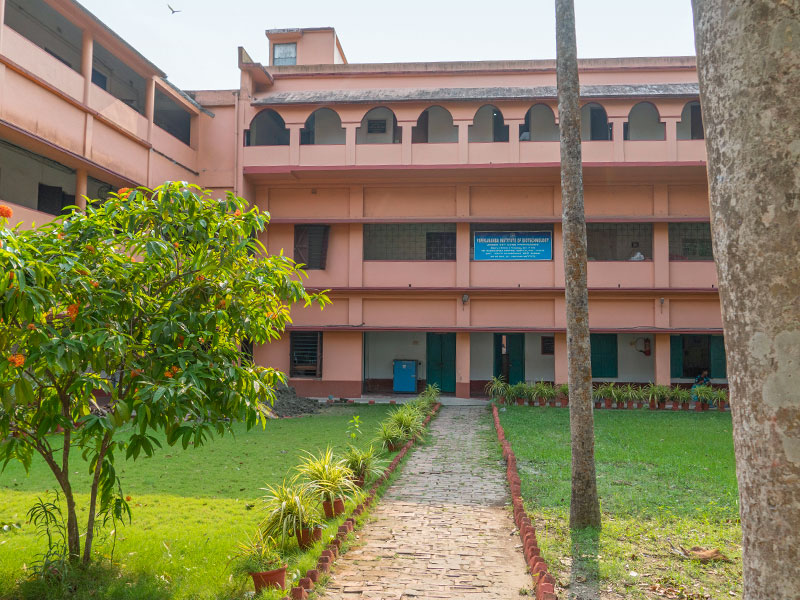


Vivekananda Institute of Biotechnology (VIB), established in 1991, has been at the forefront of biotechnological research and innovation for over three decades. Recognized as a Scientific and Industrial Research Organisation (SIRO) by the Department of Scientific and Industrial Research (DSIR), Government of India, VIB has been instrumental in developing / adapting / modulating relevant agri - biotechnologies for the rural development. Additionally, it is now a Science Technology and Innovation Hub (STI Hub) for the Sunderban region, supported by the SEED Division of Department of Science and Technology, Government of India, further solidifying its position as a hub for scientific excellence.VIB is also affiliated to University of Calcutta, offering a Post Graduate Diploma Course in Biofertilizer Technology. This affiliation enables the institute to share its expertise and knowledge with the next generation of biotechnologists, contributing to the growth and development of the field. With its strong research focus and commitment to innovation, Vivekananda Institute of Biotechnology continues to make significant contributions to the field of agri - biotechnology, aligning with its mission to harness the power of science for the betterment of society especially in rural areas of this State.
Visit VIB Website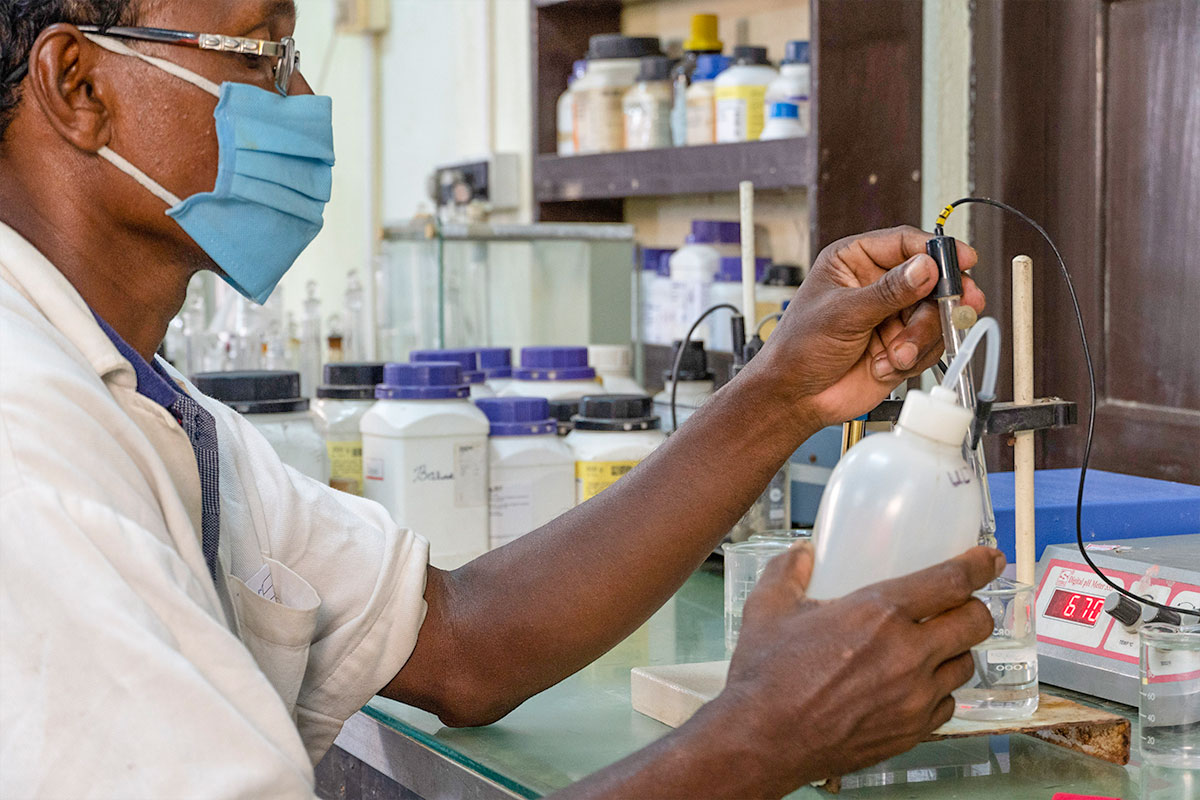
The technology of integrated nutrient management in paddy with endophytic diazotrophic bacteria is further up scaled with new isolate. This isolate has better adaptability in Sunderban soil. This is an effort to mitigate the adverse effect of soil on the efficiency of biofertilizer as this associated symbiotic bacterium is allowed to infect and establish in rice root in seed bed.
Research on mitigating the inhibitory effect of nitrogen compounds on nitrogen fixation in Azotobacter has been completed. The findings show that increasing the C:N ratio to over 10 can counteract the inhibitory effect of ammonia on Acetylene Reduction Activity, even at high concentrations of ammonium sulfate (500 gm/L) in artificial media.
A new mechanical devise fruit fly trap / melon fly trap is introduced in integrated pest management of vegetables.
Additionally, efforts to domesticate the mangrove alga, Catenella sp., for commercial production have begun on Prentice Island. To optimize biomass yield, five different gear types - mangrove branches, bamboo poles, coir ropes, cylindrical nylon tubes, and flat nylon nets - have been installed in brackish water regions to evaluate their performance.
A program on standardisation of quality seed potato through micropropagation is undertaken with an objective of production of quality potato. Two varieties were selected- Kufri Jyoti, Kufri Chandramukhi. Work on Kufri Jyoti has been done in detail. Protocol has been standardized for optimum multiple shoot production. Around 1300 micro-tubers have been produced - Mass tuberization process is standardized.
Ornamental foliage plants Syngonium, Aglaonema, Diffenbachia and Philodendron are in demand in this region – especially in the local nurseries nearby Kolkata. With an objective of production of quality plantlets of selected ornamental foliage plantlets, under the area of plant tissue culture, for Aglaonema and Diffenbachia, induction of axillary buds by injecting 30 µl of 30mg/L 6 benzyl amino purine in the corm region of the plant had to be done prior to initiation – for its successful establishment and maintenance in vitro. Cultures of Syngonium pink are maintained under the multiplication stage (in vitro) and micropropagated Aglaonema Red is successfully hardened and maintained under the nursery conditions by the nursery women. Cultures of Philodendron and Diffenbachia are still under the establishment phase.
One research work on arsenic tolerant plant growth promoting bacteria is being continued with a team of scientists of Sripat Singh College, Jiaganj lead by Dr (Ms) Debjani Mondal. Two bacteria were isolated, characterized for plant growth promoting properties and genomic analysis. These two bacteria are to be further evaluated by field trial.
Germplasm maintenance is one of our routine work. We maintain the germplasm of Biofertilizer microbes (Azotobacter-22, Rhizobium- 13, PSB-17, KSB- 12, Endophytic Diazotrophs – 26, AMF-2. Blue Green Algae- 210), Biopesticide microbes (Trichoderma viride, Pseudomonus fluorescens, Purpureocillium lilacinum), Earthworm-2, Mushroom fungi (Pleurotus ostreatus, P. eous, P. sajorcaju, P. florida, Volvariella volvacea, Calocybe indica, Agaricus sp.), Banana (Grandnaine, Robusta, Chatim, Desi Kanthali, Doodhsagu, Red banana), 2 varieties of Elephant foot Yam, 17 Indigenous variety of paddy, and 64 Thermosensitive cytoplasmic male sterile lines (TCMS) of paddy.
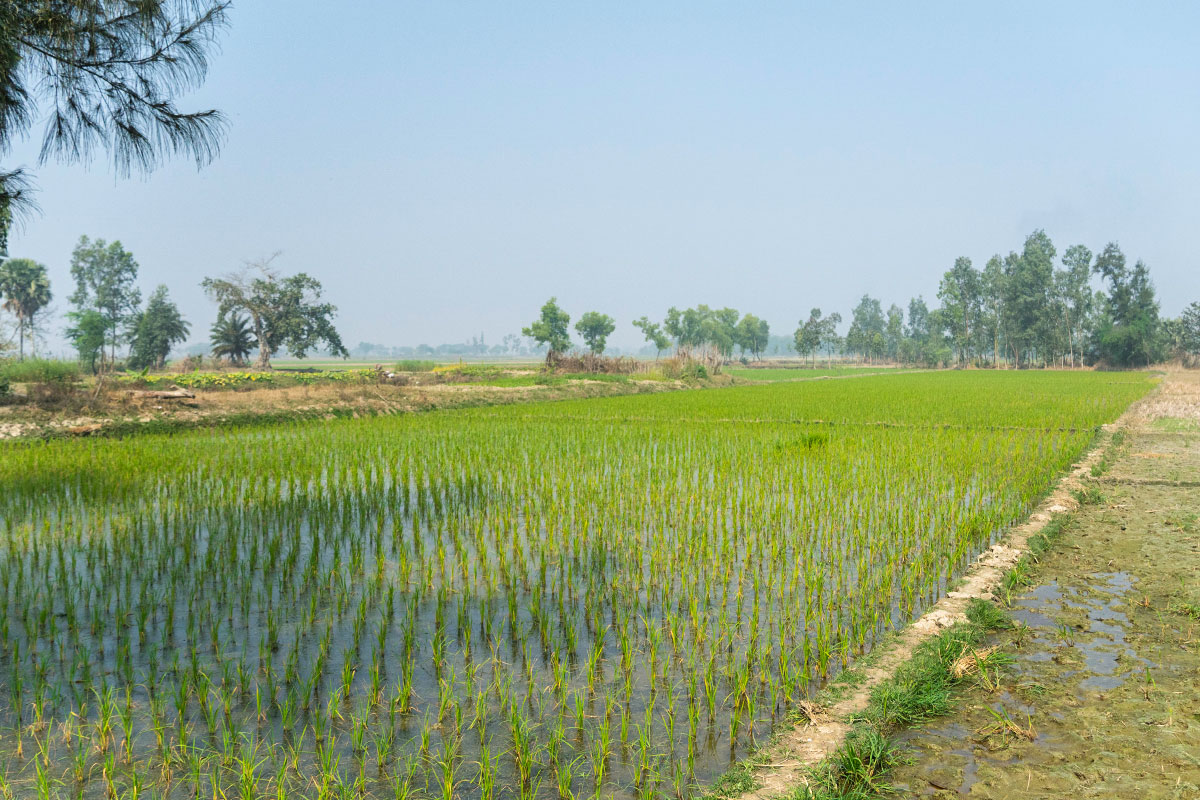
1. Good Agricultural Practices: This sustainable, ecofriendly and economical method of agriculture was transferred to 235 farmers in this year in addition to 15850 farmers in 77 villages, 11 Districts of 6 agroclimatic zones of West Bengal. The observed impact is 32% decrease in chemical fertilizer application, 64% decrease in chemical pesticide application, up to 21% increase in profit from paddy cultivation and up to 37% increase in profit from vegetable cultivation.
2. STI Hub program: Under this program, the work is being carried out in 8 blocks of Sunderbans. The aim is to improve the livelihood status of SC community of Sundarbans through S & T intervention, promoting enterprise and developing a sustainable system for technology transfer.
We have conducted household surveys in 8 target blocks, covering 548 households and 55 women SHGs. Organized awareness programs (9) with 465 participants, mentoring programs (8) for CBOs with 32 participants, skill development programs (4) for VRPs with 40 participants, technology-based interactive discussions (8) with 200 women master farmers, off-campus training programs (32) with 698 participants, initiated mobile app-based digital crop advisory services, and identified prevalent practices and traditional knowledge in the target area.
3. A program on Nypa conservation initiatives in Sunderban is started with the support of Rotary Club, Kolkata with the objective to promote the growth of Nypa, a threatened mangrove species, by planting 10,000 plants along 5 km of river embankments in Kultali and Patharpratima Blocks of Sundarbans and to enhance vegetation cover and create a natural barrier to mitigate cyclone-related disaster. Achievements so far can be listed as
• Established a Seed Germination Unit at VIB, Nimpith, with a documented growth rate of 5-34% per day.
• Set up a Nursery Unit at Patharpratima with a capacity of 5,000 plants, with 1,282 saplings planted.
• Collected 7,022 seeds from the forest, with 70% showing excellent growth in the seed bed.
• Prepared 5,047 plants for plantation.
4. A Biogas plant from kitchen waste is installed at APC College, Madhyamgram, North 24 Parganas, for generation of cooking fuel for student hostel.
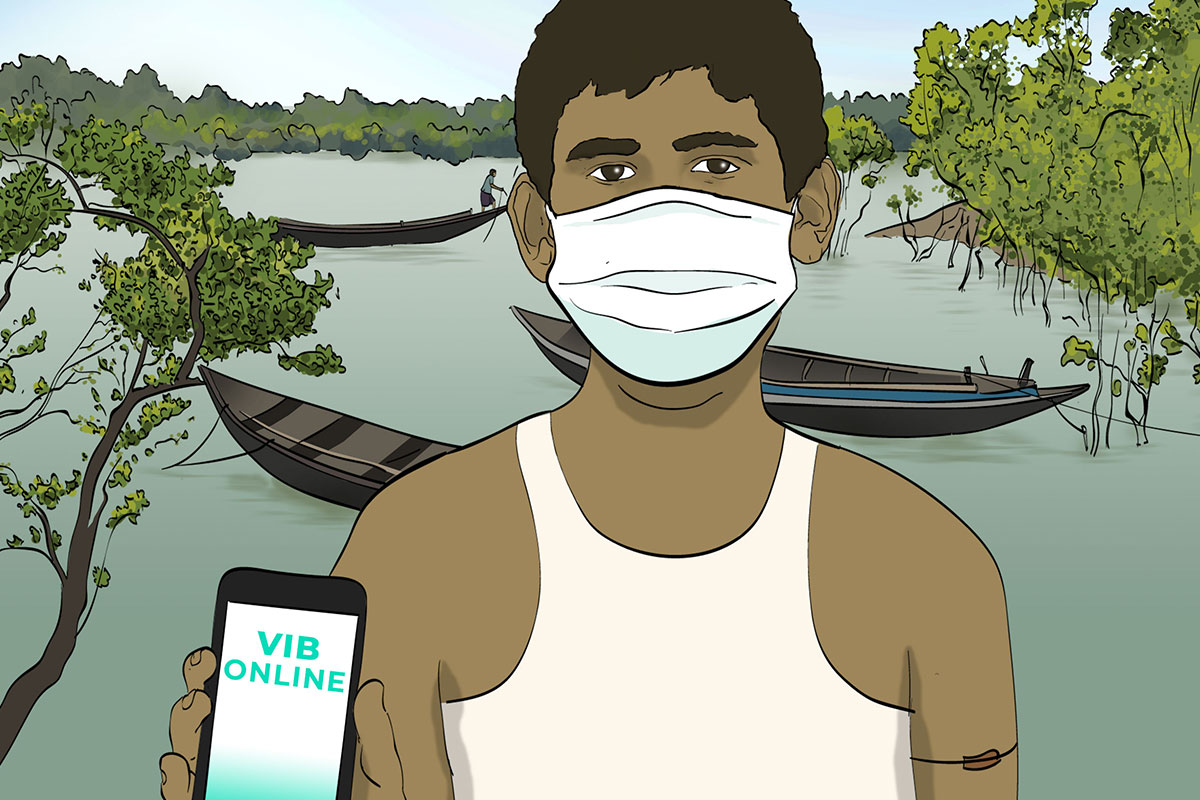
Digital Farmers’ Advisory Service: VIB have developed Mobile App Based Farmers’ advisory Services for weather forecast, pest and disease management. Total 500 farmers are registered under this program. Betel vine Yard of 100 farmers of Sagar has been brought under online QR code. All the farm details including the history of nutrient and pest management is accommodated in this QR code.
Providing service of soil, water and manure analysis- soil 6380 soil samples and 100 water samples were analyzed in this year.
Providing service of Acetylene Reduction Assay (ARA)- in addition of 80 microbial samples of this Institute, 145 samples from different other Institutions like, West Bengal State University, North Bengal University, etc. were analyzed for Nitrogen Fixation efficiency through ARA.
Production and supply of Bio-inputs - Biofertilizer- 4.6 Mt, Bio-pesticides- 14.9 Mt, Vermicompost-40 Mt, Mushroom spawn-500000 pkt( 200g each)
Production and supply of micro propagated and Nursery plantlets - Banana- 7000, Nursery plants (Flowering plants, fruit plants, vegetable seedlings, indoor plants)- 70000.
At Women’s Technology Park, Sagar, a “Jeevan-o-Jeevika Kendra” is Established from where 68 betel vine farmers were trained on betel vine production following GAP, 84 women were trained on mushroom production and 29 villagers were trained on fish production. Average 20 farmers per day gets consultancies for organic production from this center. Total 9.65 mt of bio-inputs (PF- 4,562 kg, TV- 4,555 kg, Azotobactor- 112 kg, PSB - 95 kg, KSB- 95 kg, PL- 151 kg, VAM - 45 kg) and 282 pkts mushroom spawn were distributed through this center.
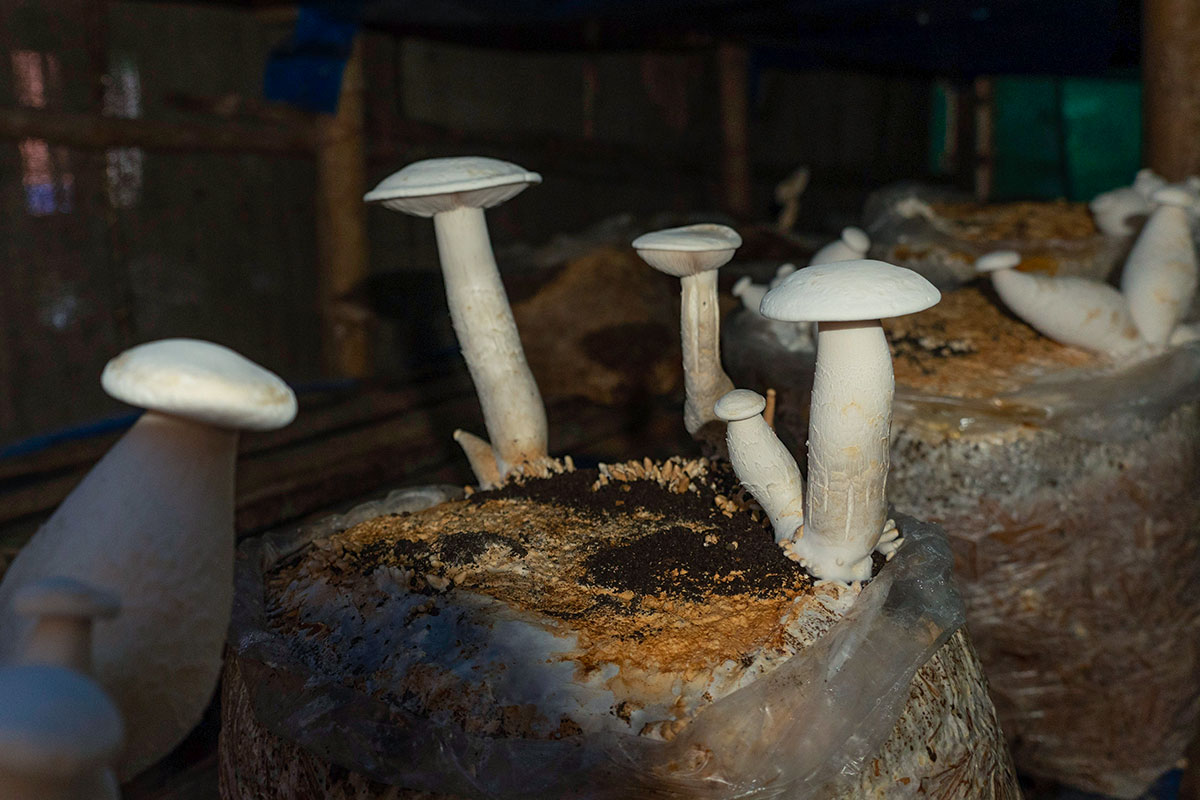
Rural entrepreneur generation is one of the targets of our activities. Training on mushroom production is provided and also quality mushroom spawn is supplied to the interested mushroom grower. This year 10 new mushroom growers are developed through this program.
Eleven village Resource Centers are working successfully from where services for soil analysis, crop clinic, farmers’ advisory and supply of bio-inputs (biofertilizer and biopesticides), EFY seed tubers etc are provided to the farmers. This creates reasonable income for the entrepreneur. The most successful entrepreneur, Sri Chandi Charan Singh of Chhatna Block (Bankura District) has organized 250 farmers for organic production of turmeric and other spices. He has established his own processing unit and supply powder of organic spices to the local market.

One Ph. D. student under Calcutta University has successfully completed his all formalities and received his provisional certificate. He has done his works here under our co-guidance.
The 4th Batch of Post Graduate Diploma Course in Biofertilizer Technology was completed in this year with 6 students.
Publications
ModaK M. K., Das S. K. and Mallick R. B.2023. Organic Farming. In Innovative Research and Technologies in Agricultural Science, Vol 6 ( eds Saxena, A. K.), Scripown Publicatrions, Rohini, North Delhi- 110086, India. Pp- 1-11.
Modak M. K., Das, S. K., Mallick, R.B., Datta B.K. and S. Kar. 2023. Effect of Good Agricultural Practices (GAP) with soil amendment on production potential of Okra (Abelmoschus esculentus) in new Alluvial Zone under West Bengal. J. Soils and Crops 33(2): 433-437.
Mandal Debjani, Das Sadhan Kumar, Jishu Adhikari, Debashis Chaterjee, Tapas Kr Bondopadhyay and Abhishekh Basu. Genome sequencing, annotation and application of a strain of Microbacterium paraoxydans – a heavy metal hypertolerant and plant growth promoting bacterium. The Microbe (Accepted)
Besides, like every year, RAKVK organizes number of extension activities such as Krishi Mela, Ex-trainee Sammelan, Field Days, formation of Kisan Gosthi and Self Help Groups, adoption of Farm Science Clubs, periodical Clinic Centers, observation of different national and international days such as the World Soil Day, National Fish Farmers’ Day, ICAR Foundation Day, International Yoga Day, Kisan Divas, Science Day, Sundarban Divas, International Women’s Day, Vigilance Week, Poshan Maah, Swachta Pakhwada, Parthenium Week, Kharif Kisan Sammelan etc. Live broadcast of launching of programmes, schemes and technologies of the Indian Council of Agricultural Research and Ministry of Ag & Farmers Welfare has been organized over time in front of farmers and farm women at the Vivekananda Conference Hall. The KVK has also given thrust on PMFBY, Swachhta Hi Sewa (SHS), PM Kisan Samman Nidhi Programme etc.